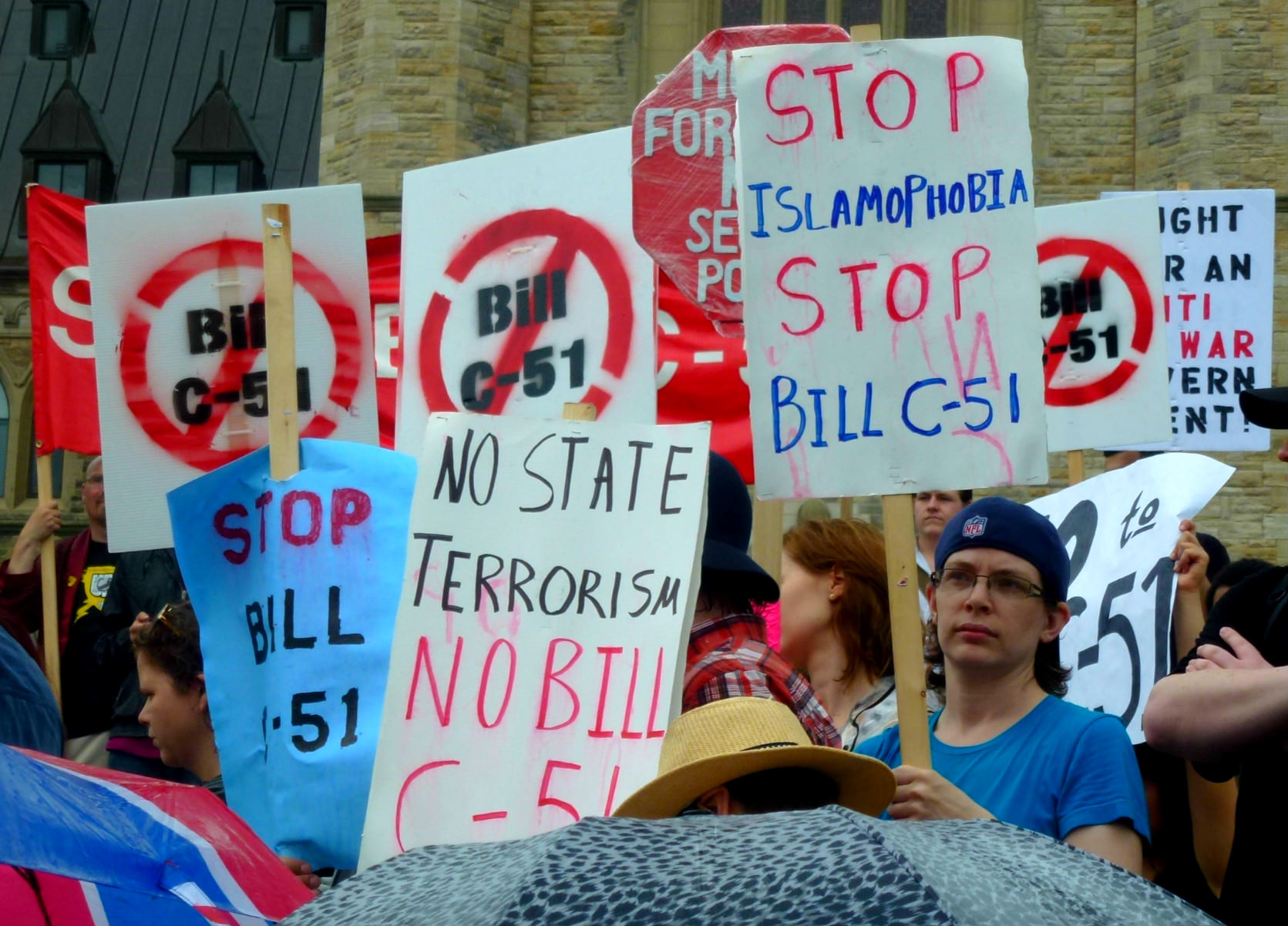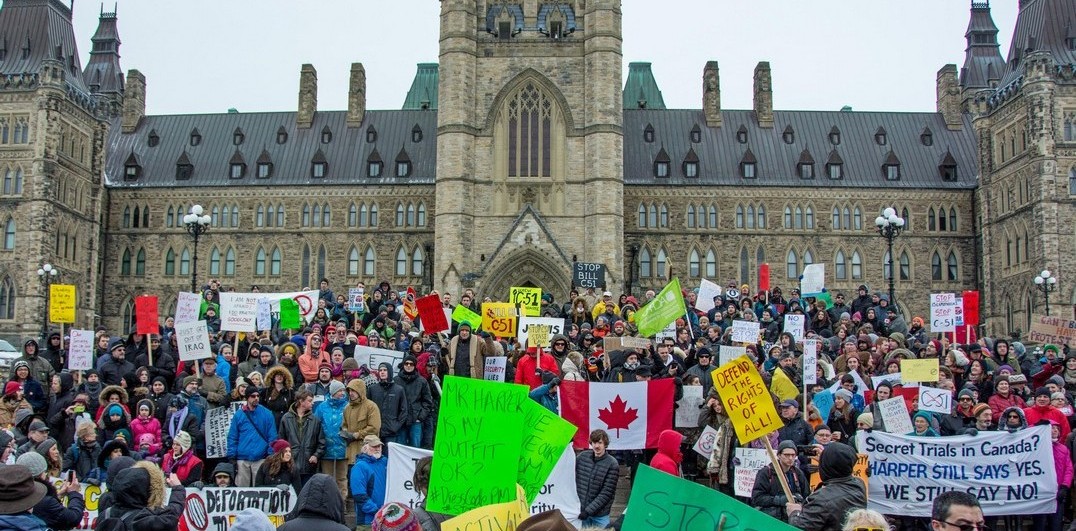By Dominique Peschard
I have been assigned the formidable task of presenting 20 years of ICLMG work on anti-terrorism legislation in less than 1,000 words. It is impossible in such a short text to even simply enumerate all the interventions on a multitude of legislative pieces, so I will focus on some key interventions which illustrate the principles that have guided the work of the ICLMG throughout the years.
The first major intervention, which set the tone for all subsequent ICLMG positions, was the report, entitled “In the shadow of the law”, submitted by the ICLMG in March 2003 in response to Justice Canada’s first annual report on the application of the Anti‑terrorism Act (ATA), also known as Bill C-36. The report underlined a series of major concerns with the ‘War on Terror’ initiated after 9/11:
- The introduction of the new crime of terrorism in the Criminal Code. The ICLMG rightly pointed out that terrorist acts were already crimes and that the broad and imprecise definition of what constituted “terrorism, facilitating terrorism and financing terrorism” could target a series of activities of political dissent having nothing to do with terrorism.
- The use of the national security argument to deprive people of their freedoms and of the right to know the “evidence” held against them. Other articles in this publication provide several examples of the denial of the right to due process and a fair trial.
- The association of terrorism with Islam. This led to the racial profiling of an entire community.
- The surveillance powers granted to police and security agencies and the constitution of vast data banks with no possibility to correct errors.
- The information sharing agreements with the US with no control over what the information would be used for.
- The lack of control and accountability over the use of these new extraordinary powers.
The report concluded by emphasizing that security is not achieved by limiting freedoms; on the contrary, freedoms are what guarantees our security.
Later, during the 2006 parliamentary review of the ATA, the ICLMG played a crucial role in the final position adopted by the NDP and the Bloc Québécois, and was instrumental in the drafting of two minority reports tabled in Parliament by these opposition parties. The minority reports called for the repeal of the ATA.
A protracted struggle took place between 2006 and 2011 when a minority Conservative government tried to re- introduce the two clauses (investigative hearings and preventive detention) which had expired as a result of a sunset clause in the ATA. The campaign and lobbying of the opposition parties against the reintroduction of these clauses was successful… until the Conservatives won a majority in 2011.
The Conservative government used the pretext of the murders of two Canadian servicemen by two isolated individuals in the fall of 2014 to introduce and adopt Bill C-51, the Anti‑terrorism Act, 2015; the most important piece of anti-terrorism legislation since the 2001 ATA. Among other things, C-51 enacted a broad information-sharing regime between government departments, increased the time a person could be detained before appearing before a judge, and gave CSIS the power to commit covert illegal acts. The ICLMG played a very active role in a broad coalition of organizations opposed to C-51 which succeeded in raising awareness and mobilizing a significant part of the population against the bill.
With the Liberals back in power in 2015, the ICLMG, along with several other organizations, undertook a campaign for the repeal of C-51. But the government ignored the numerous voices asking for the repeal, and chose instead to present and adopt yet another anti-terrorist piece of
legislation, Bill C-59, the National Security Act, 2017. Not only did C-59 not fix the problems posed by C-51, it raised more concerns, for example, granting the Communications Security Establishment – Canada’s NSA – the power to carry out defensive and offensive cyber activities at home and abroad. Nevertheless, C-59 was a partial victory. The ICLMG had campaigned relentlessly since 2006 for the implementation of a review mechanism for all national security bodies proposed by Justice O’Connor in his second report following the Commission of Inquiry Into the Actions of Canadian Officials in Relation to Maher Arar. The government finally responded to this demand by creating the National Security and Intelligence Review Agency.
Over the years, the ICLMG has systematically intervened before parliamentary committees to challenge legislative attacks on rights and freedoms and, more broadly, to inform MPs of the dangers of the measures they were asked to adopt. The ICLMG has also worked actively, alone and in coalitions, to keep the public informed on these issues. As a result, the public today is more critical and wary of new surveillance or security measures which infringe on civil liberties and human rights.
Dominique Peschard has been a co-chair of the ICLMG since 2012 and president of La Ligue des droits et libertés (LDL) from 2007 to 2015. He is currently a member of the LDL committee “Population surveillance, artificial intelligence and human rights.”
A Victory for Humanitarian Assistance!By Tim McSorley & Xan Dagenais Since the ICLMG’s creation, we have warned of the negative impact of counter-terrorism laws on the delivery of international assistance, especially to populations in regions where entities deemed by the Canadian government to be terrorist groups are active. When the Taliban regained control of Afghanistan in 2021, the Canadian government refused to give assurances that organizations providing international assistance, including humanitarian organizations, would not be prosecuted. This forced many to stop their vital work in the country. With a humanitarian crisis unfolding in Afghanistan, civil society pressured the government to amend the law to create a straightforward pathway to provide international assistance again. Unfortunately, but unsurprisingly, the government instead introduced Bill C-41 which aimed to create a complex authorization regime for organizations to provide international assistance in zones controlled by groups considered “terrorist entities” by Canada. Thanks to concerted pressure from civil society groups, including the ICLMG, the bill was amended to create, for the first time, an exemption in Canada’s laws on countering terrorist financing for the provision of humanitarian assistance. While this was a clear win, there are lingering questions around how the government is interpreting the exemption. At the same time, this exemption does not apply to Canadian international assistance organizations that carry out vital activities, but which are not exclusively humanitarian in nature, including in regards to provision of health services, defense of human rights, efforts towards peacebuilding and support towards earning a livelihood. These organizations are now subject to an unclear, burdensome and invasive authorization process in order to carry out their work in Afghanistan. Among other concerns, this new regime places the onus on these groups to prove they do not violate vaguely defined security assessment rules. These rules allow the Minister of Public Safety to deny an authorization based solely on whether any individual involved in a project, including international partners, has undefined “links” to terrorism or has ever been simply investigated on terrorism grounds. The ICLMG has documented time and again how such vague rules result in harmful impacts, including: “guilt by association” based only on unsupported allegations; political interference or ministerial discretion based on political expediency; and the promulgation of both systemic and individual bias and racism. We also remain concerned that an exemption regime does not address the central problem: that Canada’s overly-broad counter-terrorism laws allowed for this situation to occur in the first place. While an exemption regime may provide a route forward, it avoids how counter-terrorism laws create areas and entities that are considered ‘no-go,’ and continue to primarily and unjustly impact majority-Muslim countries and regions. We renew our call for the government to fundamentally revisit its approach on counter-terrorism laws and their enforcement. Although the bill received royal assent in June 2023, and despite assurances from the government that they would take quick action, the authorization regime has yet to be launched at the time of writing in April 2024, leaving millions of people without much needed assistance.[1] Tim McSorley is the National Coordinator of the International Civil Liberties Monitoring Group Xan Dagenais is the Communications and Research Coordinator of the International Civil Liberties Monitoring Group Footnote [1] Since the writing of this article, the government has launched the authorization regime. We will share critical analysis of it later. |
Back to table of contents
Since you’re here…… we have a small favour to ask. Here at ICLMG, we are working very hard to protect and promote human rights and civil liberties in the context of the so-called “war on terror” in Canada. We do not receive any financial support from any federal, provincial or municipal governments or political parties. You can become our patron on Patreon and get rewards in exchange for your support. You can give as little as $1/month (that’s only $12/year!) and you can unsubscribe at any time. Any donations will go a long way to support our work. |




